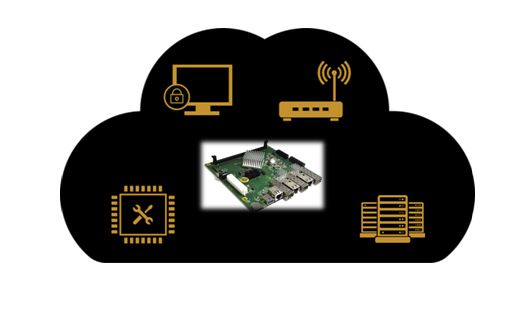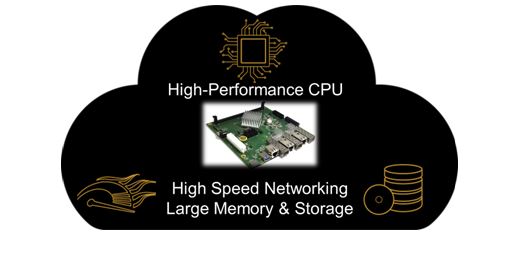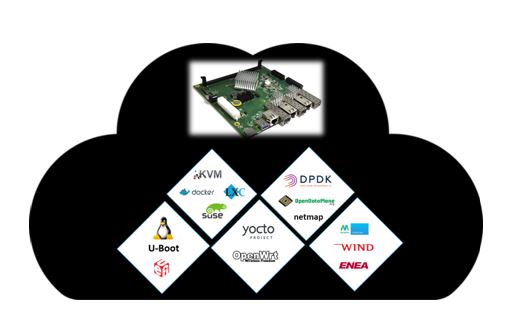Community Platform Allows Easy Adoption of ARM 64-bit in Data Center, Networking and Storage Ecosystems
Marvell MACCHIATObin community board is first-of-its-kind, high-end ARM 64-bit networking and storage community board
The increasing availability of high-speed internet services is connecting people in novel and often surprising ways, and creating a raft of applications for data centers. Cloud computing, Big Data and the Internet of Things (IoT) are all starting to play a major role within the industry.
These opportunities call for innovative solutions to handle the challenges they present, many of which have not been encountered before in IT. The industry is answering that call through technologies and concepts such as software defined networking (SDN), network function virtualization (NFV) and distributed storage. Making the most of these technologies and unleashing the potential of the new applications requires a collaborative approach. The distributed nature and complexity of the solutions calls for input from many different market participants.
A key way to foster such collaboration is through open-source ecosystems. The rise of Linux has demonstrated the effectiveness of such ecosystems and has helped steer the industry towards adopting open-source solutions. (Examples: AT&T Runs Open Source White Box Switch in its Live Network, SnapRoute and Dell EMC to Help Advance Linux Foundation's OpenSwitch Project, Nokia launches AirFrame Data Center for the Open Platform NFV community)
Communities have come together through Linux to provide additional value for the ecosystem. One example is the Linux Foundation Organization which currently sponsors more than 50 open source projects. Its activities cover various parts of the industry from IoT ( IoTivity , EdgeX Foundry ) to full NFV solutions, such as the Open Platform for NFV (OPNFV). This is something that would have been hard to conceive even a couple of years ago without the wide market acceptance of open-source communities and solutions.
Although there are numerous important open-source software projects for data-center applications, the hardware on which to run them and evaluate solutions has been in short supply. There are many ARM® development boards that have been developed and manufactured, but they primarily focus on simple applications.
All these open source software ecosystems require a development platform that can provide a high-performance central processing unit (CPU), high-speed network connectivity and large memory support. But they also need to be accessible and affordable to ARM developers. Marvell MACCHIATObin® is the first ARM 64-bit community platform for open-source software communities that provides solutions for, among others, SDN, NFV and Distributed Storage.
 A high-performance ARM 64-bit community platform
A high-performance ARM 64-bit community platform
The Marvell MACCHIATObin community board is a mini-ITX form-factor ARM 64-bit network and storage oriented community platform. It is based on the Marvell hyperscale SBSA-compliant ARMADA® 8040 system on chip (SoC) that features four high-performance Cortex®-A72 ARM 64-bit CPUs. ARM Cortex-A72 CPU is the latest and most powerful ARM 64-bit CPU available and supports virtualization, an increasingly important aspect for data center applications.
Together with the quad-core platform, the ARMADA 8040 SoC provides two 10G Ethernet interfaces, three SATA 3.0 interfaces and support for up to 16GB of DDR4 memory to handle highly complex applications. This power does not come at the cost of affordability: the Marvell MACCHIATObin community board is priced at $349. As a result, the Marvell MACCHIATObin community board is the first affordable high-performance ARM 64-bit networking and storage community platform of its kind.
SolidRun (https://www.solid-run.com/) started shipping the Marvell MACCHIATObin community board in March 2017, providing an early access of the hardware to open-source communities.
The Marvell MACCHIATObin community board is easy to deploy. It uses the compact mini-ITX form factor, enabling developers to purchase one of the many cases based on the popular standard mini-ITX case to meet their requirements. The ARMADA 8040 SoC itself is SBSA-compliant (http://infocenter.arm.com/help/topic/com.arm.doc.den0029/) to offer unified extensible firmware interface (UEFI) support.
The ARMADA 8040 SoC includes an advanced network packet processor that supports features such as parsing, classification, QoS mapping, shaping and metering. In addition, the SoC provides two security engines that can perform full IPSEC, DTL and other protocol-offload functions at 10G rates. To handle high-performance RAID 5/6 support, the ARMADA 8040 SoC employs high-speed DMA and XOR engines.
For hardware expansion, the Marvell MACCHIATObin community board provides one PCIex4 3.0 slot and a USB3.0 host connector. For non-volatile storage, options include a built-in eMMC device and a micro-SD card connector. Mass storage is available through three SATA 3.0 connectors. For debug, developers can access the board’s processors through a choice of a virtual UART running over the microUSB connector, 20-pin connector for JTAG access or two UART headers. The Marvell MACCHIATObin community board technical specifications can be found here: MACCHIATObin Specification.
Open source software enables advanced applications
The Marvell MACCHIATObin community board comes with rich open source software that includes ARM Trusted Firmware (ATF), U-Boot, UEFI, Linux Kernel, Yocto, OpenWrt, OpenDataPlane (ODP) , Data Plane Development Kit (DPDK), netmap and others; many of the Marvell MACCHIATObin open source software core components are available at: https://github.com/orgs/MarvellEmbeddedProcessors/.
To provide the Marvell MACCHIATObin community board with ready-made support for the open-source platforms used at the edge and data centers for SDN, NFV and similar applications, standard operating systems like Suse Linux Enterprise, CentOS, Ubuntu and others should boot and run seamlessly on the Marvell MACCHIATObin community board.
As the ARMADA 8040 SoC is SBSA compliant and supports UEFI with ACPI, along with Marvell’s upstreaming of Linux kernel support, standard operating systems can be enabled on the Marvell MACCHIATObin community board without the need of special porting.
On top of this core software, a wide variety of ecosystem applications needed for the data center and edge applications can be assembled.
For example, using the ARMADA 8040 SoC high-speed networking and security engine will enable the kernel netdev community to develop and maintain features such as XDP or other kernel network features on ARM 64-bit platforms. The ARMADA 8040 SoC security engine will enable many other Linux kernel open-source communities to implement new offloads.
Thanks to the virtualization support available on the ARM Cortex A72 processors, virtualization technology projects such as KVM and XEN can be enabled on the platform; container technologies like LXC and Docker can also be enabled to maximize data center flexibility and enable a virtual CPE ecosystem where the Marvell MACCHIATObin community board can be used to develop edge applications on a 64-bit ARM platform.
In addition to the mainline Linux kernel, Marvell is upstreaming U-Boot and UEFI, and is set to upstream and open the Marvell MACCHIATObin ODP and DPDK support. This makes the Marvell MACCHIATObin board an ideal community platform for both communities, and will open the door to related communities who have based their ecosystems on ODP or DPDK. These may be user-space network-stack communities such as OpenFastPath and FD.io or virtual switching technologies that can make use of both the ARMADA 8040 SoC virtualization support and networking capabilities such as Open vSwitch (OVS) or Vector Packet Processing (VPP). Similar to ODP and DPDK, Marvell MACCHIATObin netmap support can enable VALE virtual switching technology or security ecosystem such as pfsense.
Thanks to its hardware features and upstreamed software support, the Marvell MACCHIATObin community board is not limited to data center SDN and NFV applications. It is highly suited as a development platform for network and security products and applications such as network routers, security appliances, IoT gateways, industrial computing, home customer-provided equipment (CPE) platforms and wireless backhaul controllers; a new level of scalable and modular solutions can be further achieved when combining the Marvell MACCHIATObin community board with Marvell switches and PHY products.
Summary
The Marvell MACCHIATObin is the first of its kind: a high-performance, cost-effective networking community platform. The board supports a rich software ecosystem and has made available high-performance, high-speed networking ARM 64-bit community platforms at a price that is affordable for the majority of ARM developers, software vendors and other interested companies. It makes ARM 64-bit far more accessible than ever before for developers of solutions for use in data centers, networking and storage.
Recent Posts
- Marvell Named to America’s Best Midsize Employers 2026 Ranking
- Ripple Effects: Why Water Risk Is the Next Major Business Challenge for the Semiconductor Industry
- Boosting AI with CXL Part III: Faster Time-to-First-Token
- Marvell Wins Interconnect Product of the Year for Ara 3nm 1.6T PAM4 DSP
- Improving AI Through CXL Part II: Lower Latency



